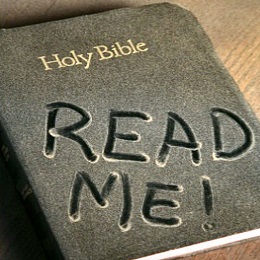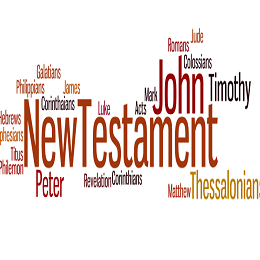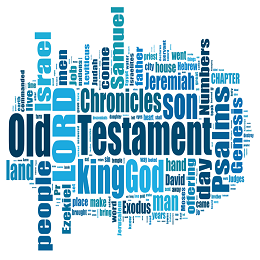RELATIONSHIP WITH
GOD & THE BIBLE

YOU AND YOUR BIBLE
The Bible is God's Word to man. It reveals the plan of God for all of mankind. It reveals the nature of God, the sinfulness of man, the plan of salvation in Christ, the prospects of heaven for the saved, the doom of the unsaved in hell, guidelines for the Christian to follow in order to live and act as they should. It is God's word to us. It is the most important object we have on this earth.
We are to love it, learn it, and then live by it. He will strengthen your faith, speak to your heart, and give you guidance and direction for every need and decision in your life. “Your word is a lamp for my feet, a light on my path” (Psalms 119:105).
Step 3 Your Relationship with God & Your Bible
 Reading the Bible
Reading the Bible
The entire “Christian” conversation and the most distinctive part of our faith is focused on God’s desire to have a relationship with us. He wants to be your friend and heavenly father. He wants you to know him, which is a deeply personal connection. At first, God may seem like a distant being, but He’s not. He’s very available. The more you know him, the more you will love Him and many, many other benefits will come. To know God, you need to be with God.
The first, best way to know God is to read, and/or listen to the Bible, which is also referred to as “God’s Word” or “Scripture.” Consider God’s word daily bread you can’t live without.
Do you have a Bible reading plan?
Our purpose and goal is that you as an individual will find the Bible reading plan that will make you successful in reading God's Word. Each Bible Reading Plans are designed for different individuals. Some folks are like me, not a strong reader and some folks can read many chapters each day, some are just beginning their adventure with reading the Bible, and some have a good grasp of God's Word for them as individuals. Each Bible reading plan is clearly marked for you can pick a plan that will lead to a successful time for you to learn all about God. We all have started a project and have never finished. Our heart's desire is for you to finish your goal of learning and to receiving from God's Word (the Bible) here.
To be Successful in Your Bible Reading!
Encourage you to study the Bible with our free Study Guides designed for you here.
Discover new insights into your Bible reading with our free Bible Study Methods here.
Join us in unlocking the scriptures with our free 70 Bible Daily Reading Plans designed for you as an individual from two week plans to 2-year plans from Book Study to Topical Studies for all ages here.
You can unlock God's Word by using our free 7 Bible Reading Cheat Sheets here. Cheat Sheets is a concise set of notes used for quick reference used for Bible reading and studying here.
Example:
| Scripture: Chapter and Paragraph Titles? PRAY, direct your will, make a commitment; Look at the whole book, then Chapters, & then verses STEP I & II: PRAY & HOW |
Observations: What Does it Say? Give the "looks'" observe grammar & literary style STEP III: OBSERVE IT |
Observations: What Does it mean? Ask questions, be aware of making errors, use "tools," implications, " who what where, when, how, & why." STEP IV: QUESTIONS |
Application: How Does It Apply to Me? Make an emotional identification! Look for the answers, dig personally, let it affect you! STEP V & VI: KNOW IT & APPLY |
| Passage:___________________ Key Verse(s): Key Word(s): |
Biblical Statements: | My Questions: | What Will I Do: When Will I Do It? BE OBEDIENT!!! |
LIST OTHER INFORMATION AND PRAYER ITEMS:
Just a note:
New Christians may want to get a Bible designed for “new believers” that offer how the Bible is organized, how to find certain passages, provide interpretation, and additional sections to answer some of the more common questions we all wrestle with. Also, don’t get bogged down trying to read the Bible cover to cover, and save books like “Deuteronomy” and “Numbers” for later on, because these are historical oriented and demonstrate the validity of the context. Instead, start with the New Testament, learning about the life and teachings of Jesus.
 A good place for a new believer to start is the Book of John which is known as the "Gospel of Love" or "Gospel of John". Use something like the New International Version (NIV) to read the Bible. We recommend a New International Devotional Bible or a New International Study Bible. There are a lot of good Bibles that are designed for new Christians. A suggestion go to this site www.biblegateway.com and as an example put in John 3 and go through the different translations and see what is the best for you. If you need to buy a Bible online would recommend www.christianbook.com. If you need any help, please feel free to contact us here.
A good place for a new believer to start is the Book of John which is known as the "Gospel of Love" or "Gospel of John". Use something like the New International Version (NIV) to read the Bible. We recommend a New International Devotional Bible or a New International Study Bible. There are a lot of good Bibles that are designed for new Christians. A suggestion go to this site www.biblegateway.com and as an example put in John 3 and go through the different translations and see what is the best for you. If you need to buy a Bible online would recommend www.christianbook.com. If you need any help, please feel free to contact us here.
Here are a few suggestions you can look for at www.christianbook.com usually under $15.00 here. NIV Discover God's Heart Devotional Bible, Fulfilled: The NIV Devotional Bible for Single Women, The Great Rescue Discover NIV, NIV Celebrate Recovery, KJV Study Bible, Men's Devotional Bible Hardcover, and many more here.
Ask God to speak to your heart before you start and then listen to your heart as you read. You need to spend time reading God's word. At least once a day read a portion of the Bible. You can read a chapter or a column, or, if you have a modern translation, even a short a paragraph. The Gospel of John is a good place for a new Christian to become introduced to Christ and His Message.
If you are new to the Bible or are a new Christian, we highly recommend starting at the Book of John in the New Testament. We have two study guides on the Gospel of John.
Plan 1 - With the 21 days Bible Reading 5 minutes a day challenge, you'll walk with Jesus through the Gospel of John and engage God's Word on a daily basis. It's as easy as reading a chapter a day here.
Plan 2 - This plan is 21 days Bible Reading 15 minutes a day challenge for new Christians and for those searching and people on the go. Start your day by talking to God, reading the Bible and reflecting on your day. We have created a unique series of study guides to go along with your daily reading on Gospel of John sent once a day by email for 21 days on the Gospel of John here.
 Establish a Quiet Time
Establish a Quiet Time
You need to grow in your new faith in Christ. And to do this, it is essential for you to establish a quiet time. By “quiet time” I do not mean a peaceful moment in a bubble bath. I mean getting alone with God and His Word. In the hustle and bustle of modern life, we sometimes find it easy to live our lives with little or no regard for the God who saved us or for His Word.
The Bible is the revelation of God’s mind to you. It’s what He wants you to know and do. Not only did God give His Son the Living Word to save you, He gave His Book the Written Word to guide you.
Many people own a Bible, but they never read it. For most people, it’s an out-of-date book, good for their grandparents but not for them. Someone has said that if everyone blew the dust from their unused Bibles simultaneously, we’d all be killed in the dust storm.
To be sure, some sections of the Bible are difficult to understand, and some are not as exciting as others.
Once John Bunyan, the author of Pilgrim’s Progress, said something like this: “I have sometimes seen more in a line of the Bible than I could understand; and yet at other times the whole Bible has been to me as dry as a stick.” Still, every section of God’s Word has something to say to us, and that makes every passage very important.
 When should you have your quiet time? It’s important to read the Bible as often as possible. But I have found it helpful to have a specific time each day when I shut everyone out except God.
When should you have your quiet time? It’s important to read the Bible as often as possible. But I have found it helpful to have a specific time each day when I shut everyone out except God.
For me, that specific time is early in the morning. My mind is less cluttered then and my day is less complicated. Besides, God deserves me at my best, and the best part of my day is the first part.
“O God, You are my God, earnestly I see you;” (Psalm 63:1).
Perhaps you will find another time of day suits your lifestyle better. That’s fine. But make sure you establish a time and stick to it. What should you do when you have your quiet time?
HERE IS A 6 STEP PLAN
It helps me make my moments with God and His Word more meaningful.
1. Start with Prayer. Ask God to prepare you to meet with Him. If there is something in your life that you know displeases Him, confess it. Let Him forgive you so that nothing will hinder your communion together.
2. Read a specific portion of Scripture - perhaps a chapter or two. If you are not very familiar with the Bible, we encourage you to start with the New Testament. Many people think that the Gospel of John is a good place to start. I also enjoy reading one or two of the Psalms every day. We have a daily study guide you can sign up for on the Gospel of John that is sent out daily. You can learn more about the Gospel of John guide here.
Study a Book of the Bible - If you are new to the Bible or a new Christian we highly recommend starting at the Book of John in the New Testament. We have two study guides on the Gospel of John.
Plan 1 - With the 21 days Bible Reading 5 minutes a day challenge, you'll walk with Jesus through the Gospel of John and engage God's Word on a daily basis. It's as easy as reading a chapter a day here.
Plan 2 - This plan is 21 days Bible Reading 15 minutes a day challenge for new Christians and for those searching and people on the go. A special series of free Study Guides to go along with your daily reading on Gospel of John sent once a day by email for 21 days on the Gospel of John here.
 3. After you have read a passage, Meditate on it for a while. Think about what you read, and ask yourself what it means. What does God want you to do? Remember, even though you may not understand all you read in the Bible, you can still obey what you do understand.
3. After you have read a passage, Meditate on it for a while. Think about what you read, and ask yourself what it means. What does God want you to do? Remember, even though you may not understand all you read in the Bible, you can still obey what you do understand.
Write down questions about the passage as you read. I always keep a pen and notebook nearby when I read my Bible. I write down the things I have learned from my reading and also the things I do not understand. Later I can find the answers to my questions from someone who knows about the subject, or I can find an explanation in a Bible commentary or some other Bible reference material.
4. Then Read the passage Again. Reading it the second time usually brings to light things you didn't notice the first time. This is a great way to learn on your own; for as you read, you’ll have God’s Holy Spirit as your teacher. (John 14:26).
5. Finally, Pray Again. Thank God for sending His Son to die for you. Thank Him for giving you His Word the Bible because without it you would have no answers to life’s big questions. Thank Him for teaching you from the passage you have just read.
Just a note:
 One last thing. Many new Christians start a quiet time each day with great enthusiasm. But they soon get too busy. Their days fill up with activities, and other responsibilities press in upon them. And somehow God gets squeezed out.
One last thing. Many new Christians start a quiet time each day with great enthusiasm. But they soon get too busy. Their days fill up with activities, and other responsibilities press in upon them. And somehow God gets squeezed out.
6. Consistency is the key. The person who merely samples the Word of God never acquires much of a taste for it. You must come back to the banquet table of God’s Word daily, just as you come to a table daily to eat physical food. Once you start, don’t quit!
Come to your Bible regularly. Open it prayerfully, read it expectantly, trust it implicitly and live it constantly. It is true! The Bible that’s falling apart usually belongs to someone who isn’t.
Take each step for the new and mature Christian and let God by the Holy Spirit work in your life to do exciting things. Guaranteed!!
Pray and ask God to speak to you before you start... and read it as though God will speak to you through it and He will!!
HIGHLY RECOMMEND - To be Successful in Your Bible Reading!!
More On Bible Study Methods here.
Free Bible Study Guides here.
Study the Bible by Topical Study Methods here.
70 Bible Reading Plans here.
Study God's Word here.
Bible Study Methods here.
10 Creative Bible Reading Methods here.
Overview of the Books of the Bible here.
Themes of the Bible Books here.
AN OVERVIEW OF THE BIBLE
The Bible is not just one big book, but actually a collection of 66 smaller books written over a period of at least 1600 years by about 40 different authors. Everything they wrote was inspired by God. In the front of your Bible is a Table of Contents which lists the names of all the books in the Bible. The Bible is divided into two sections: the first section which contains three-fourths of the Bible is called the Old Testament, the second section is called the New Testament.
What do the numbers mean? There is a handy abbreviation that Christians use to specify verses in the Bible. They list the name of the book first, followed by the chapter number, and then the verse number. For example John 3:16 means the book of John, chapter 3, verse 16. This way you can quickly and easily locate scriptures.
 The New Testament (Recommend reading the New Testament first).
The New Testament (Recommend reading the New Testament first).
The New Testament reveals to us Jesus and the plan of salvation. It begins with the book of Matthew and ends with the book of Revelation. It is divided into four general areas:
The first four books: Matthew, Mark, Luke, and John tell us the story of Jesus when he was on this earth.
The book of Acts tells us the history of the early church after Jesus' death and resurrection.
The letters (from Romans to Jude) are correspondence from early Christian leaders to other churches or individuals.
The book of Revelation tells us the future story of the end time when Jesus will come back to this world and reign on earth.
A new believer should always start reading the Bible in the first four books of the New Testament, called the Gospels. The book of John is especially easy to understand. Check out our free study guide on the Gospel of John. Some short letters in the New Testament (also called epistles) which are helpful to new believers are the books of Philippians, James, and 1 John.
 The Old Testament
The Old Testament
The Old Testament reveals to us how God dealt with the nation of Israel. It looks forward to the coming Savior of the world, Jesus. It begins with the book of Genesis and ends with Malachi. It is also divided into four general areas:
The first five books (Genesis to Deuteronomy) tell us the beginning of man and the establishment of the nation of Israel with the promise of the Savior of the world coming from this chosen people. It not only contains the early history of Israel, but also the Law of God as revealed through Moses. For example, Exodus chapter 20 records the Ten Commandments.
The next twelve books (Joshua to Esther) are the historical books of the nation of Israel after it became a kingdom in Canaan. Two short books in this section which reveal God's hand on the life of believers, which new Christians may enjoy, are the books of Ruth, and Esther.
The next five books (Job to Song of Solomon) are the books of poetry and wisdom in the Bible. Especially helpful to new believers are the book of Psalms, which was the hymnal or songbook of the nation of Israel; and Proverbs, which contains the sayings and advice of the wisest king Israel had.
The last seventeen books (Isaiah to Malachi) are the books of the prophets of Israel who God sent to warn, admonish, and encourage his people toward the end of the history of Israel as a nation.
HOW TO STRENGTHEN MY FAITH?
GO HERE STEP 4 - RELATIONSHIP AND PRAYER
Home New Christian Next to You & Prayer
Copyright 2016-2018. Questions God. Com. All Rights Reserved.
